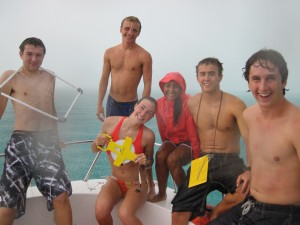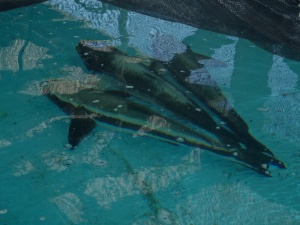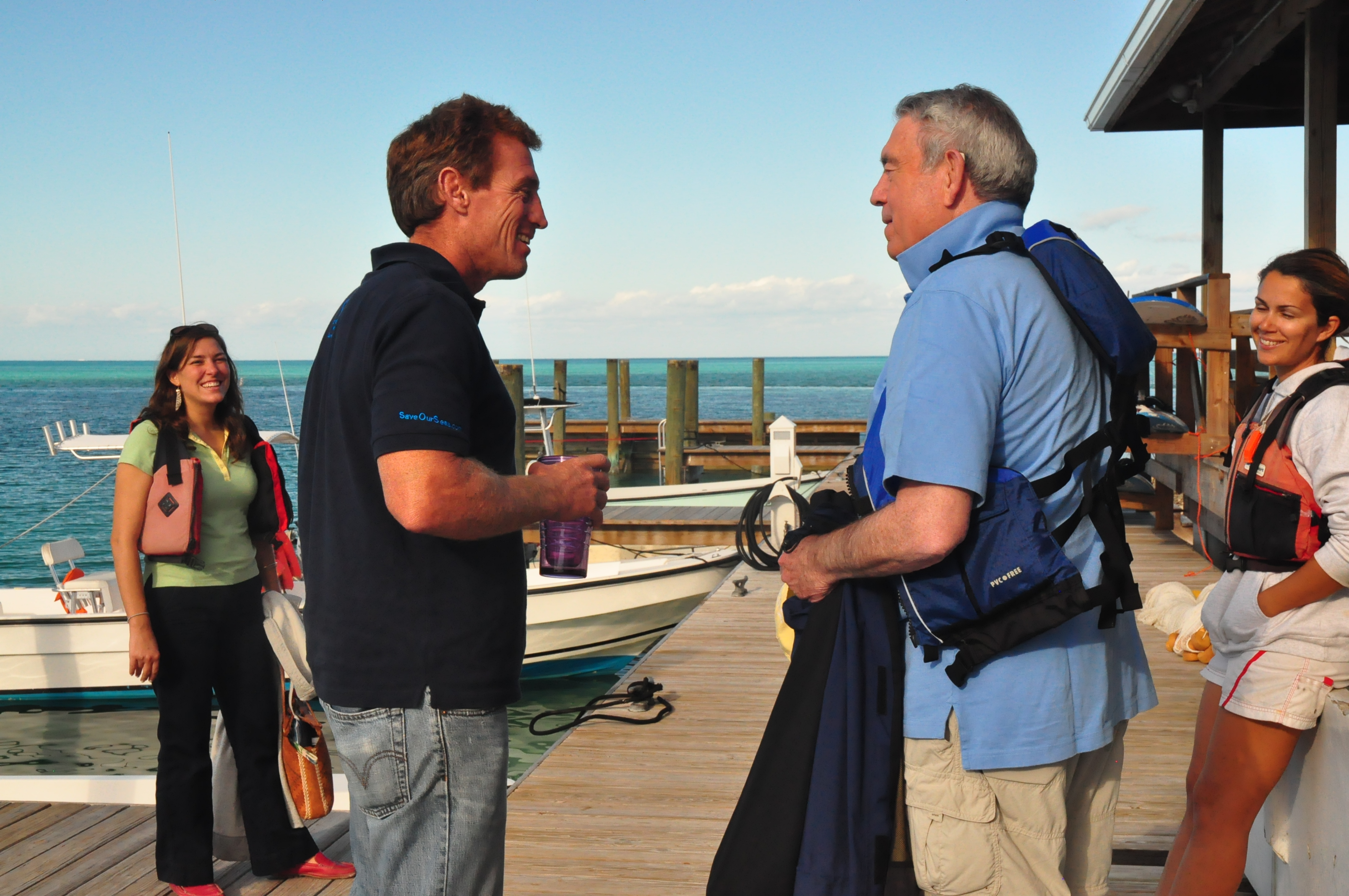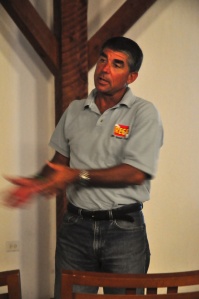 An aquamarine ocean, stretching from the shallowest of waters to the deepest of abyss may be a lonely place; at times nothing but stretches of white sand and swaying sea grass is found upon the seafloor. Following a yellowtail snapper though, one may find themselves floating over a bustling patch reef. What is a patch reef you may ask? Located in shallow waters, these isolated coral reef outcrops, with an array of brightly colored fish and slow moving invertebrates; provide an essential transitional habitat for juvenile fish still unequipped for the strains of the open ocean. Continue reading
An aquamarine ocean, stretching from the shallowest of waters to the deepest of abyss may be a lonely place; at times nothing but stretches of white sand and swaying sea grass is found upon the seafloor. Following a yellowtail snapper though, one may find themselves floating over a bustling patch reef. What is a patch reef you may ask? Located in shallow waters, these isolated coral reef outcrops, with an array of brightly colored fish and slow moving invertebrates; provide an essential transitional habitat for juvenile fish still unequipped for the strains of the open ocean. Continue reading
Tag Archives: Cape Eleuthera Institute
F’11 Conch Research Update
F’11 First Flats Research Update
The Fall 2011 Flats Research program kicked off their first class with Sam Saccomanno, Annie Blanc, Kate Maroni, Tori Suslovitch, Brendan McDonnell, Franklin Rodriguez, and our research advisors, Justin, Liane, and Ally. The focus of our research group is to study and raise awareness about mangrove conservation.
[slideshow]
What are flats and mangroves? Flats are the area between land and sea where there is a broad surface level but shallow depth. Flats can be shallower than just a few centimeters and as deep as 2 meters. Mangroves are a plant species that thrive in the flats ecosystem and are very important on both an ecological and economic level. They are important nursery grounds and breeding sites for birds, fish, crustaceans, shellfish, reptiles and mammals, are renewable source of wood, accumulation sites for sediment, contaminants, carbon and nutrients, and offer protection against coastal erosion. Continue reading
Fall 2011 First Aquaculture Research Project Update!
[slideshow]
Aquaculture Fall 2011 is off to a great start! Six enthusiastic students have embarked on a journey through the wild scientific studies of Aquaculture. Already, we have trod through mangroves, swum through strong currents, and collected 200 water samples in the past week. We have been testing pH level, levels of nitrogen and phosphorous, salinity, dissolved oxygen, and temperature of the water. The water sample data we collected is being used to see if the mangroves surrounding the school and institute filter the water efficiently. The water is collected outside of the CEI campus and is then used in the CEI labs to raise fish. After the water goes through CEI, it goes through the mangroves and back out into the ocean. Hopefully our water sample research will show that the mangroves do effectively filter the water. Later on in the semester, we will dive down ninety feet to our underwater Aquaculture cage in order to help inform ourselves on ways to improve the problems Aquaculture has faced. We will keep you updated on our progress throughout the rest of the semester!
Carlton University Field Course Videos
Every winter for the past few years, the Cape Eleuthera Institute has hosted biologist Nigel Waltho and a group of students from Carlton University in Ottawa, Ontario for a two-week dive-intensive field course. During their stay, the students develop individual projects on coral disease, reef health, fish communities, etc. At the conclusion of the course, they must put prepare and present a final report. Nigel has recently uploaded a number of videos from their time in Eleuthera. Check out all their videos here!
It is official, Gobies clean brood stock cobia!
What an exciting Monday morning for aquaculture! We now have 3 goby breeding pairs that have all laid eggs this week. Our most recent pair needed to be separated from the two other resident gobies, so we decided to experiment. It has been relayed by word of mouth that gobies will clean parasites off the cobia. Nothing is ever that easy at CEI, so we needed to see it to believe it.
Nine thirty this morning, Marie and I decided to take the leap of faith and place the 2 gobies into the brood stock cobia tank. No one knew what to expect. Would the gobies like their new home? Would the cobia know to stay still so the gobies could clean them? How long would it take until we would observe the gobies actually cleaning the cobia?
Dan Rather Reports from the Cape
Dan Rather along with a film crew and a team of producers visited Cape Eleuthera last week to film a piece about lionfish. The piece is for his show on HDNet, Dan Rather Reports. He visited the Cape to see first-hand both the extent of and learn the effects of the lionfish invasion and what is being done in response. Rather’s visit coincided with researchers Lad Akins and Stephanie Green’s being on campus to conduct their ongoing lionfish research at the Cape Eleuthera Institute.
The film crew spent an entire day on boats visiting reefs and filming with Akins and Green, as well as with CEI’s own lionfish researchers Annabelle Oronti and Skylar Miller. The piece, which will air in the next couple of weeks on HDNet, will feature interviews and footage from in the field. Last month, the New York Times featured a piece on the lionfish invasion in Atlantic and Caribbean waters, and Rather’s visit to report on them underscores the importance of the issue and the work being done at CEI to understand and deal with the problem.
Congratulations…it’s a cobia!

by: Team Acult Research- Augie Cummings and Lea Luniewicz

Although we were down 3 scientist, Lea and Augie continued the research on the almighty sharknose goby. Earlier in the week we were on track to dive the cage, but despite Tyler’s heroic effort to save the day, we were without a boat. We recently received a small batch of 400,000 cobia eggs and spent all of Friday’s class separating out 8,500 cobia into a different tank.
The gobies are living it up in the pairing tank while some of those sly sharknoses have found their mates, and have moved on to better, more private real estate. They all seem to be getting to know each other better and some on more levels than others. All the color of the gobies have seemingly returned so physically they are looking pretty too. We believe that the guys indoors have been doing better because of the much more pleasurable environment. Until next time, stay classy South Eleuthera!
Lecture on Lionfish with Lad and Stephanie
Last night our community had the opportunity to attend a lionfish presentation from REEF’s (Reef Environmental Education Foundation) Director of Operations Lad Akins and lionfish researcher from Simon Fraser University, Stephanie Green. Their presentation gave students, interns, and staff an update on the lionfish invasion in the Caribbean. Atkins presented research on the breadth of the invasion as well as reasons why lionfish have gained such a strong foothold outside their native Indo-Pacific range. Green then spoke to students about the implications of the invasion on native fisheries in the Caribbean, as well as what is being done to curb the advance.
In addition to lionfish education and training people in the invaded areas, REEF has planned Continue reading



